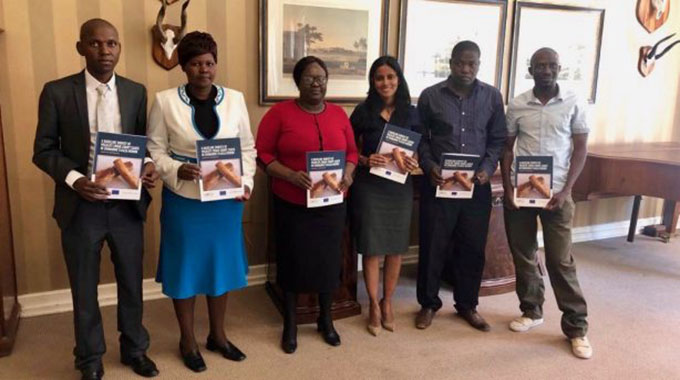Zimbabwe courts commended

Pamela Shumba, Senior Reporter
ZIMBABWE’s courts have been commended for handling wildlife crimes effectively, with eight in every 10 prosecutions involving elephant ivory or protected species ending in convictions.
According to the first major survey of trial outcomes released by Space for Giants, the conviction rate for elephant cases is 83 percent and 76 percent for specially protected species.
An international conservation organisation Space for Giants worked with a local group Speak Out For Animals to carry out the survey as part of an EU-funded project to combat the illegal trade in the Kavango-Zambezi (KAZA) Trans frontier Conservation Area, a swathe of southern Africa, the size of Spain that includes parts of Zambia, Botswana, Namibia, Angola and Zimbabwe.
The survey found 345 recorded wildlife poaching cases between 2015 and 2018 in the southern part of the country. Of the accused, 77 percent were Zimbabweans, 22 percent were Zambians and one percent of them were Chinese.
“In 60 percent of the cases, there was only one accused person. Guilty pleas were entered in more than 75 percent of general wildlife cases while guilty pleas were entered in only 39 percent of elephant cases and 31 percent of cases involving specially protected species.
“Most cases involved bush meat, mainly kudu, impala and buffalo. There were also 35 elephant cases involving 195kg of ivory, 21 pangolin cases, five python cases and one involving 21kg of rhino horn cut into 49 pieces,” reads part of the survey.
It said approximately 70 percent of wildlife cases were concluded within one week of their first arraignment in court. “The conviction rate for elephant cases was 83 percent and 76 percent for specially protected species.
The accused were sent to prison in 96 percent of elephant cases, with 80 percent receiving a term equal or greater to the minimum nine-year mandatory sentence.
“For specially protected species, 81 percent of the cases resulted in a custodial sentence and over 80 percent received the mandatory minimum nine-year sentence or greater,” said the survey. Space for Giants director of Wildlife Law and Justice and the lead author of the survey, Mr Shamini Jayanathan said the organisation was committed to supporting the judicial authorities in each country to strengthen prosecutions against suspected wildlife criminals.
He said the survey assessed cases registered between 2015 and 2018 at the main magistrates’ courts that fall within the KAZA region’s jurisdiction.These include Victoria Falls, Hwange, Lupane, Binga and Kariba, Bulawayo, Plumtree and Tsholotsho.
NPA Chief Public Prosecutor, Mr Chris Mutangadura said the authority welcomes the illuminating report and thanked the European Union, Space for Giants and Speak Out for Animals for their endeavour.
“Having examined the data and the findings, we whole heartedly endorse the recommendations and trust that all the authorities involved in fighting the scourge of wildlife crime will take these findings and build upon the successes and challenges identified,” said Mr Mutangadura.
Zimbabwe Parks and Wildlife Management Authority head of wildlife crime investigations, Mr Amos Gwema, described the report as very good, saying it depicted what was happening in the country’s courts.
“It highlights the successes and the challenges we face and strengthens our commitment to fight wildlife crimes which are a threat to our natural resources.”
In its recommendations, Space for Giants called for the review and reform of the Parks and Wildlife Act, particularly in relation to the range of offences and sentencing provisions for ivory cases.
It also called on the raising awareness to the judiciary and prosecution services on aspects of the Parks and Wildlife Act relating to specially protected species, given sentencing disparities in different cases involving pythons or pangolins.
The organisation also recommended the issuing of sentencing guidelines to achieve consistency and proportionality in sentencing and increase prosecutorial training to prioritise prosecution-led investigations by the NPA, ZRP and ZPWMA, as well as build capacity to conduct cross-border investigations with neighbouring jurisdictions.Community and public engagement regarding the value of wildlife and the penalties for wildlife crime was also recommended. — @pamelashumba1











Comments